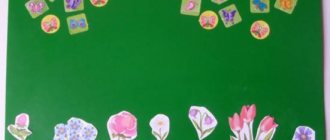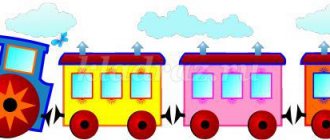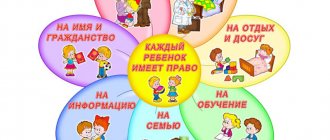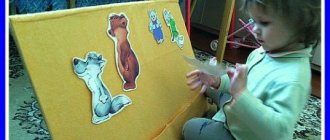First parent meeting in early childhood group
Summary of the parent meeting in the early age group “Children’s Adaptation to Kindergarten”
Author: Yulia Alekseevna Gorchakova, teacher at the Irdanovsky kindergarten “Kolosok”, Nikolsky district, Vologda region.
Description of the material: I bring to your attention a summary of the parent meeting, which may be useful to teachers of the early groups of kindergarten. Information about adaptation is relevant for parents who are enrolling their child in kindergarten for the first time. Goal: getting to know the parents of their future students, disseminating teaching experience and knowledge among parents. Objectives: create conditions for parents to get to know each other, tell parents about the baby’s adaptation to kindergarten, set parents up for friendly relations and relaxed communication. Progress of the parent meeting. Good evening. We are glad to see you at our meeting, at the first parent meeting. Today we have gathered to get to know you and also to discuss the important problem of a child’s adaptation to kindergarten. First, let's get acquainted. Please stand in a circle. We pick up a toy and talk about ourselves. For example, I am Yulia Alekseevna Gorchakova, teacher of the younger mixed-age group. (You tell us whose mom you are or whose dad you are, and what your family is like).
My family is very friendly, athletic, funny, smart, and so on.
Game in a circle "Getting to know each other". It's very nice to meet you! Now take a seat, there are materials for creativity in front of you. Your task is to introduce your family in 5 minutes; draw or make an application with which you can tell a little about your family: literally two to three sentences. Creative workshop “Imagining the Family”. Conversation about adaptation. What do you think adaptation is? What do you know about the adaptation period? Parents' thoughts on "How to facilitate the baby's adaptation." I want to tell you a little more about this problem. Enrolling a child in kindergarten is the first step into independent life, which is not easy for all children. Our task is to make sure that the adaptation period is painless for the child. Show presentation. Adaptation is the adaptation of the body to changing external conditions. There are three types of adaptation. Who is easier to adapt? - Children whose parents prepared them for visiting the kindergarten in advance, several months before this event (this means that the parents read fairy tales about kindergarten, walked near the kindergarten...) - Children who are physically healthy and do not have chronic diseases. - Children who have independence skills. - Children whose regime is close to the kindergarten regime (this is the daily routine, sleep, nutrition). — Children whose diet is close to the garden. Call on a fairy tale or game to help.
You can come up with a fairy tale about how the bear went into the garden.
How he liked it there, at first it was uncomfortable and a little scary, but he made friends with the children and the teacher. You can play this fairy tale with toys. And the key point in it is the return of the mother for the child. Competition for parents for the best fairy tale for a child. (Parents are given 5 minutes to write a short fairy tale. Then everyone reads out their fairy tale; based on the results of the competition, all parents receive small prizes: plasticine, markers, albums, as well as reminders on the problem of adaptation).
I invite you to play my fairy tale.
Distribution of roles: day, sun, two clouds, Mother Bear, Mishutka, a ray of sunshine, teacher, two - three children. Theatricalization of the fairy tale “Teddy bear in kindergarten”. (I read the text, parents role-play the described actions).
It was a warm summer day. The bright sun was shining, cheerful clouds were playing catch-up in the sky. A little mischievous ray of light looked into Mishutka’s nursery, stroked his head, his cheek, and then it tickled him! Mishka woke up, stretched, and then Mother Bear came: “Good morning, son!” Mom helped Mishutka put on the clothes she had prepared the night before, fed her a light breakfast and said that today Mishutka would have to go to kindergarten. The little bear knew what it was, his mother had been telling him about the kindergarten for a long time, they even went together to see where it was, walked on the playground with other children, so Misha was not particularly upset, on the contrary, he wanted to quickly get into this amazing, bright world. But as soon as Mishutka entered the kindergarten, he felt that his mother was worried, and some strange uneasy feeling came over him. The bear kissed Mishka, said that she would return soon, and then somehow very quickly disappeared. The baby was confused, he immediately wanted to cry, but then a very sweet and kind aunt came up to him. She invited him to see the toys and even allowed him to play with them. Mishutka was confused again. There were so many bright and beautiful toys on the shelves! And a new construction set, something Misha didn’t even have at home! And a wind-up little train, and many different cars, and also cubes, dishes... Mishka wanted to touch everything - everything. Strange kids walked around and distracted Mishutka a little, but the same auntie patted the baby on the head and gave him a lot of bright pencils and an album. How fun it was to draw the sun and grass and clouds in the sky with her! The rain began to cry outside the window. Misha, too, suddenly felt sad, and he also wanted to cry, but then the aunt took him in her arms, sat him on her lap and began to read a funny book. What colorful pictures there were in it, and how interestingly the dear aunt read, changed her voices, sang songs. It wasn't scary at all with her, it was even good. Mishutka liked her more and more, there were beautiful buttons on her blouse, and her auntie smiled all the time. “It turns out that this is the teacher, that’s what another aunt said, what a difficult word...” thought Mishka. It was easier for him to call her mom, especially since she is as good as mom. When thinking about her mother, tears welled up in Mishutka’s eyes. The teacher asked: “What are you doing, Mishenka?” and took him to wash his hands, and then sat him down at the table. How delicious the porridge turned out to be! Then there was absolutely no time to be bored. Together with all the children, the bear danced, built a long fence for the horse, then walked and swung on a swing. And all the time his second mother was nearby, helping him to climb, dismount, and stand up. Mishutka felt that he was tired. The teacher took everyone to the kindergarten to wash their hands. Then there was a very tasty lunch. And how I wanted to sleep! Immediately the teacher put Mishka in a soft crib and stroked him on the head. His eyes began to close on their own, and when Mishka woke up, his mother was already waiting for him at the door. And everything was fine, Mishutka thought that he would definitely come to his new home to play with his new friends.
That’s the end of the fairy tale, and what talented actors are gathered here!
Let's continue our conversation. Signs of a child's readiness for kindergarten. Parents and children are most upset in the morning when they separate. Long goodbyes and persuasion with a worried expression on the face will cause anxiety in the child. Remember, children most often calm down immediately after their parents disappear from sight. Here are some tips. - Speak confidently to your child both at home and in the garden. Calmly. - Let the child be taken away by the parent or relative with whom it is easier for him to leave. - Be sure to say that you will come and indicate when. — You should have your own farewell ritual, after which you leave confidently. - Under no circumstances should you be frightened by kindergarten (“If you’re playing around, I’ll take you to kindergarten, and you’ll live there alone!”) - You shouldn’t speak badly about the teachers or the kindergarten in front of your child. - Don’t deceive the child, you promised to pick him up early, keep your promise. Stop worrying, everything will be fine. Support the baby, show your love, say kind words. After kindergarten, spend more time with your child, ask how his day was, what he did in kindergarten. If you have any questions, you can ask us. In the locker room on the stands you can see information for you, there are our phone numbers, watch out for the announcements on the doors where the magpie brought the news. Now let's rest a little and play scouts. Game "Scouts". Your task is to find a mate by meeting the other person's eyes and standing together. And I will ask you to perform the following tasks in pairs: Stand up - shoulder to shoulder, now knee to knee, shoulder to shoulder, elbow to elbow. And now all together: palm to palm. Holding hands, they formed something whole - a circle, a collective. We want you to walk through all 5 years hand in hand like this and become one big happy family. Thank you for your attention!
We recommend watching:
Parent meeting on traffic rules in the preparatory group. Parent meeting in the 1st junior group. Notes Notes of parent-teacher meetings in kindergarten. Junior group Notes of the parent meeting in the second junior group
Similar articles:
Summary of the final parent meeting in the second junior group
Scenario for a parent meeting on traffic rules in a preschool educational institution
Parent meeting in kindergarten. My child
Summary of the parent meeting in the first junior group
Scenario for a parent meeting in the senior group “The role of home and family in shaping the personality of a preschooler”
Russia, Stavropol region, Nevinnomyssk city
MBDOU No. 24 "Rainbow"
Educator
Tsikulaeva E.A.
Goal: getting to know the parents of their future students, disseminating teaching experience and knowledge among parents.
Objectives: create conditions for parents to get to know each other, tell parents about the baby’s adaptation to kindergarten, set parents up for friendly relations and relaxed communication.
Progress of the parent meeting.
Good afternoon. We are glad to see you at our meeting, at the first parent meeting. Today we have gathered to get to know you and also to discuss the important problem of a child’s adaptation to kindergarten. First, let's get acquainted. Please stand in a circle. We pick up a toy and talk about ourselves. For example, I am Lyudmila Valerievna Melnikova, teacher. (You tell us whose mom you are or whose dad you are, and what your family is like). My family is very friendly, athletic, funny, smart, and so on.
Game in a circle "Getting to know each other".
Conversation about adaptation.
What do you think adaptation is? What do you know about the adaptation period?
Parents' thoughts on "How to facilitate the baby's adaptation."
I want to tell you a little more about this problem.
Adaptation is the body’s adaptability to changing external conditions. A process that often takes place with tension and overexertion of the mental and physical forces of the child’s body. The following changes literally burst into the child’s usual, established life:
v Clear daily routine;
v Lack of relatives nearby;
v Constant contact with peers;
v The need to obey a previously unfamiliar person;
v A sharp decrease in personal attention.
vIn order to make adaptation to kindergarten as painless as possible for the child: you need to make it gradual. Because every child gets used to it in his own way.
vHowever, we can note some patterns in the child’s behavior that I would like to tell you about. For example, call for help from a fairy tale or game.
You can come up with a fairy tale about how the bear went into the garden. How he liked it there, at first it was uncomfortable and a little scary, but he made friends with the children and the teacher. You can play this fairy tale with toys. And the key point in it is the return of the mother for the child.
There are certain reasons that cause tears in a child.
The main reason is anxiety associated with a change in environment. From the familiar, calm home atmosphere, where his mother is always there and will help at any moment, he moves into an unfamiliar space where she is not there. He meets friendly but strangers, so it is difficult for the child to accept the norms and rules of life of the group he is in. In addition, the child’s personal regime is violated. All these factors can provoke hysteria and reluctance to go to kindergarten, as well as colds.
The second reason. Lack of self-care skills.
This makes it very difficult for the child to stay in kindergarten.
Third reason. Excess of impressions. Kids experience a lot of positive and negative experiences; they can become overtired and, as a result, become nervous, cry and be capricious.
Based on how children adapt to kindergarten, they can be divided into three main groups.
Easy degree of adaptation.
It lasts from 10 to 20 days.
Average degree of adaptation.
It lasts from 20 to 40 days.
Severe degree of adaptation.
This adaptation lasts from 2 to 6 months.
In order for your child to adapt to kindergarten as quickly and easily as possible, you must adhere to the following rules.
- Plan your time so that during the first month of your child’s visit to kindergarten, you have the opportunity not to leave him there for the whole day. The first weeks of visiting kindergarten should be limited to 2-4 hours, later you can leave the baby until lunch, for a nap, and at the end of the month (if the teacher recommends it) bring the baby for the whole day.
- At home, on weekends or during illness, it is necessary to follow a daily routine that is more similar to the kindergarten routine:
breakfast 8-9 am;
lunch 12-13 hours;
sleep from 13 to 15 hours;
afternoon snack at 16:00, bedtime no later than 21-22:00.
And try to adhere to this regime as much as possible.
- In case of pronounced negative emotions, it is advisable to refrain from visiting kindergarten for 2–3 days.
- Tell your family and friends in the presence of your child that he is already going to kindergarten. What a great guy he is. After all, he is now an adult, just like mom and dad go to work.
- Come up with a tradition - farewells or greetings (shakes of hands, kisses on the nose, “See you soon”), these simple but regularly repeated little things will allow the baby to predict the situation (mom always comes for me when she says: “Bye, see you soon”).
- Parting should not be delayed; say goodbye easily and quickly. Don't make your child anxious. Your calmness, confidence and smile tell your baby that everything is fine and you can safely go to the group.
- Try to pick up your child from kindergarten early.
- Teach your child at home all the necessary self-care skills (they will help the child feel more confident): washing, drying hands; dress and undress; eat independently, ask to go to the toilet.
- Clothes must be comfortable for a child of this age so that he can put them on and take them off independently without difficulty.
- Reduce the load on the child's nervous system. Stop going to public places for a while and reduce your viewing of television programs.
- During the adaptation period, be tolerant of your child’s changed behavior. You are an adult and you must understand that he is capricious not because he is “bad”, but because it is very difficult for him to get used to the new room, children, teachers and regime.
- And most importantly, you yourself must get used to the thought: “My child is going to kindergarten, he will feel good there, they will take care of him, he will play with his peers. I want him to go to kindergarten."
Remember that when a child begins attending kindergarten, he is temporarily deprived of physical contact with his mother. It is important for small children to be picked up, hugged, and put to sleep. Therefore, at home, try to pay more attention to your child. Read to him at night, play with him, watch cartoons together, do creative tasks assigned in kindergarten. Be gentle, patient and kind. Enjoy your child!!! And most likely, the stress associated with visiting kindergarten will be avoided. If you see that a child has developed a need for cooperation with loved ones and strangers, if he strives for independence, if he is open and friendly towards his peers, we congratulate you!!!
And now I invite you to improvise, I will give you pieces of paper and pens, you must write affectionate words, as you call the child at home, so we will call them in the group. Here is our magic jar, I put all the leaves in it, and every day we will pull out one leaf.
Now let's stand in a circle and hold hands, we want you to walk through all 5 years hand in hand and become one big happy family.
Thank you for your attention!







